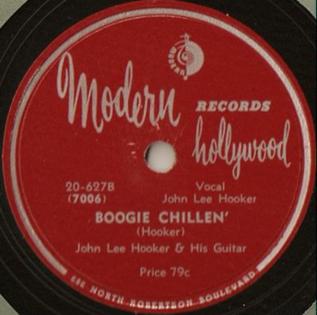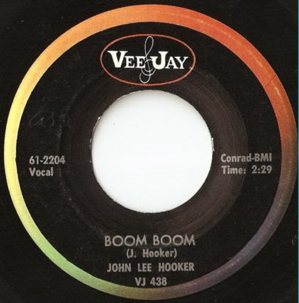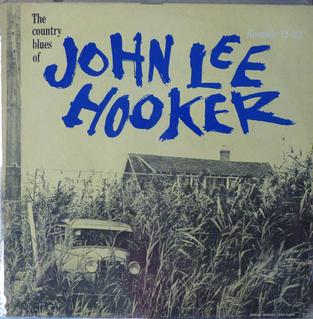
John Lee Hooker was an American blues singer, songwriter, and guitarist. The son of a sharecropper, he rose to prominence performing an electric guitar-style adaptation of Delta blues. Hooker often incorporated other elements, including talking blues and early North Mississippi hill country blues. He developed his own driving-rhythm boogie style, distinct from the 1930s–1940s piano-derived boogie-woogie. Hooker was ranked 35 in Rolling Stone's 2015 list of 100 greatest guitarists.

Mathis James Reed was an American blues musician and songwriter. His particular style of electric blues was popular with blues as well as non-blues audiences. Reed's songs such as "Honest I Do" (1957), "Baby What You Want Me to Do" (1960), "Big Boss Man" (1961), and "Bright Lights, Big City" (1961) appeared on both Billboard magazine's rhythm and blues and Hot 100 singles charts.

Canned Heat is an American blues and rock band that was formed in Los Angeles in 1965. The group has been noted for its efforts to promote interest in blues music and its original artists. It was launched by two blues enthusiasts Alan Wilson and Bob Hite, who took the name from Tommy Johnson's 1928 "Canned Heat Blues", a song about an alcoholic who had desperately turned to drinking Sterno, generically called "canned heat". After appearances at the Monterey and Woodstock festivals at the end of the 1960s, the band acquired worldwide fame with a lineup of Hite (vocals), Wilson, Henry Vestine and later Harvey Mandel, Larry Taylor (bass), and Adolfo de la Parra (drums).

Eddie Harris was an American jazz musician, best known for playing tenor saxophone and for introducing the electrically amplified saxophone. He was also fluent on the electric piano and organ. His best-known compositions are "Freedom Jazz Dance", popularized by Miles Davis in 1966, and "Listen Here".
Eddie Taylor was an American electric blues guitarist and singer.

"Boogie Chillen'" or "Boogie Chillun" is a blues song first recorded by John Lee Hooker in 1948. It is a solo performance featuring Hooker's vocal, electric guitar, and rhythmic foot stomps. The lyrics are partly autobiographical and alternate between spoken and sung verses. The song was his debut record release and in 1949, it became the first "down-home" electric blues song to reach number one in the R&B records chart.
James C. Bracken was an American songwriter and the co-founder and co-owner of Vee-Jay Records with his wife Vivian and her brother, Calvin Carter.

"I Wish You Would" is a song recorded by Chicago blues musician Billy Boy Arnold in 1955. It was developed while Arnold was performing with Bo Diddley and incorporates a Diddley-style rhythm. Called "a timeless Chicago blues classic", "I Wish You Would" is Arnold's best-known song and has been recorded by several artists, including the Yardbirds, who recorded it for their debut single in 1964.

Alan Christie Wilson, nicknamed "Blind Owl", was an American musician, best known as the co-founder, leader, co-lead singer, and primary composer of the blues band Canned Heat. He sang and played harmonica and guitar with the group live and on recordings. Wilson was the lead singer for the group's two biggest U.S. hit singles: "On the Road Again" and "Going Up the Country".

"On the Road Again" is a song recorded by the American blues-rock group Canned Heat in 1967. A driving blues-rock boogie, it was adapted from earlier blues songs and includes mid-1960s psychedelic rock elements. Unlike most of Canned Heat's songs from the period which were sung by Bob Hite, second guitarist and harmonica player Alan Wilson provides the distinctive high pitched vocal, sometimes described as a falsetto.

Hooker 'n Heat is a double album released by blues musician John Lee Hooker and the band Canned Heat in early 1971. It was the last studio album to feature harmonica player, guitarist and songwriter Alan Wilson, who died in September 1970 from a drug overdose. The photo on the album cover was taken after Wilson's death, but his picture can be seen in a frame on the wall behind John Lee Hooker. Guitarist Henry Vestine was also missing from the photo session. The person standing in front of the window, filling in for Henry, is the band's manager, Skip Taylor. Careful examination of the photo reveals that Henry's face was later added by the art department. Although featured on the cover, vocalist Bob Hite does not sing on the album.

"Boom Boom" is a song written by American blues singer and guitarist John Lee Hooker and recorded in 1961. Although it became a blues standard, music critic Charles Shaar Murray calls it "the greatest pop song he ever wrote". "Boom Boom" was both an American R&B and pop chart success in 1962 and a UK top-twenty hit in 1992.

"One Bourbon, One Scotch, One Beer" is a blues song written by Rudy Toombs and recorded by Amos Milburn in 1953. It is one of several drinking songs recorded by Milburn in the early 1950s that placed in the top ten of the Billboard R&B chart. Other artists released popular recordings of the song, including John Lee Hooker in 1966 and George Thorogood in 1977.
Calvin Tollie Carter was an American record producer, record label manager and songwriter of jazz and pop songs.

"Bottle Up and Go" or "Bottle It Up and Go" is a song that is a standard of the blues. Based on earlier songs, Delta bluesman Tommy McClennan recorded "Bottle It Up and Go" in 1939. The song has been interpreted and recorded by numerous artists, sometimes using alternate titles, such as "Step It Up and Go", "Shake It Up and Go", etc.
Lefty Bates was an American Chicago blues guitarist. He led the Lefty Bates Combo and worked with the El Dorados, the Flamingos, Jimmy Reed, John Lee Hooker, Buddy Guy, Etta James, the Aristo-Kats, the Hi-De-Ho Boys, the Moroccos, and the Impressions. A regular on the Chicago blues scene, his major work was as a session musician on numerous recordings in the 1950s and 1960s.

The Folk Lore of John Lee Hooker is an album by blues musician John Lee Hooker, released by Vee-Jay Records in August or September 1961. Hooker recorded most of the songs on January 4, 1961, in Chicago, with two recorded live at the Newport Folk Festival June 25, 1960.

I'm John Lee Hooker is an album by blues musician John Lee Hooker. Released by Vee-Jay Records in 1959, it compiles seven songs originally released as singles between 1955 and 1958 along with five new tracks recorded in 1959.

The Country Blues of John Lee Hooker is an album by blues musician John Lee Hooker recorded in Detroit in 1959 and released by Riverside Records in January 1960.

"I'm in the Mood" is a blues song written and originally performed by John Lee Hooker, and first recorded by him in 1951. The original recording is reportedly one of the highest-selling blues records of all time.
















